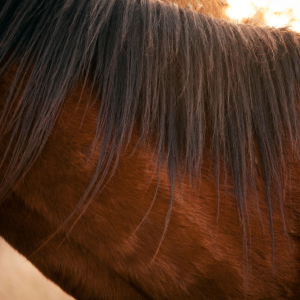
Summer eczema, or tail and mane eczema, is unfortunately a very well-known condition that can affect the health and well-being of our horses.
Understanding the role of nutrition in summer eczema is critical for horse owners and caregivers.
In this article, we dive deeper into the relationship between nutrition and summer eczema, and explore how a balanced diet can help prevent and treat this condition.
Summer eczema is an allergic reaction to the bites of culicoides mosquitoes, which can cause intense itching, skin irritation and inflammation in horses.
The symptoms of summer eczema, such as rubbing, rash and hair loss, can cause significant discomfort to horses and their owners.
Summer eczema is also referred to as tail and mane eczema because that is where horses itch and shed the most.
Nutrition plays a crucial role in the development and severity of summer eczema.
Nutrients and allergens in food can exacerbate inflammatory reactions and allergic symptoms in horses.
Choosing the right foods and avoiding potential toxins and allergens can help reduce the symptoms of summer eczema.
As we all know, horses are herbivores: they eat only plant material and especially plant material with a lot of crude fiber.
In digesting that crude fiber, your horse uses a large number and variety of bacteria, fungi and yeasts.
All of these microorganisms together are called the intestinal flora or microbiome.
Your horse’s microbiome ferments the crude fiber.
This fermentation converts crude fiber into energy available to your horse.
In addition to fermenting crude fiber, the microbiome has another important function: driving immune cells.
Immune cells provide the body’s defenses against disease fighters.
A healthy microbiome puts immune cells to work in the right way so that they can do their job to the best of their ability.
Therefore, an imbalance in the microbiome causes the immune cells to be less well controlled, causing them to work inadequately or even too actively.
The latter is the case with summer eczema.
In this way, proper nutrition can contribute to a healthy microbiome and thus reduce hypersensitivity reactions in summer eczema.
For horses with summer eczema, there are specific dietary recommendations that can help manage the condition.
Adding nutritional supplements and selecting foods with anti-inflammatory properties can be beneficial for horses with summer eczema.
Adjusting the nutritional management and regimen of horses with summer eczema can have a positive impact on their health.
Seasonal dietary adjustments, such as reducing sugary foods and adding foods that support skin health, can help reduce summer eczema-related symptoms.
As already mentioned, stimulating healthy microbiome is important in this regard.
By offering a varied amount of crude fiber, you optimize your horse’s gut flora and reduce the chances of an overreaction.
In addition, products such as flaxseed, olive oil and various herbs can help support the skin and allow any toxins to be better removed by the liver.
Preventive measures, such as avoiding standing water and using fly rugs, can help prevent summer eczema.
Treatment options range from medication to adjusting nutrition and dietary management.
A holistic approach, which includes nutrition and environmental factors, is often the most effective.
The time of day that your horse goes outside or just back in the barn can also help reduce the problems.
The mosquitoes to which your horse is allergic become active mainly around dusk, both in the early morning and in the evening.
Therefore, make sure your horse is not outside at least around that time.
Especially on cooler nights and during rain, wind or bright sunshine, mosquitoes are also less active.
Those are also good times to put your horse outside.
The relationship between nutrition and summer eczema is complex and diverse.
By adjusting nutrition, improving dietary management and supporting a healthy microbiome, horse owners can contribute to the well-being and health of horses with summer eczema.
An informed approach and collaboration with veterinarians and nutrition experts are essential to successfully managing summer eczema in horses.
To properly support your horse’s health, we recommend three products.
First, Fibre Grass for a healthy base and optimal functioning of the microbiome.
In addition, Care Fit Support Mix provides a healthy base combined with beneficial herbs for optimal support of the immune system and the functioning of liver and kidneys.
Optionally, you can supplement with the ViMi Care to give your horse sufficient vitamin and mineral, without ballast.
Free of molasses, soy and grains.
The combination of these 3 products form an optimal ration for horses with summer eczema.
Discount Applied Successfully!
Your savings have been added to the cart.